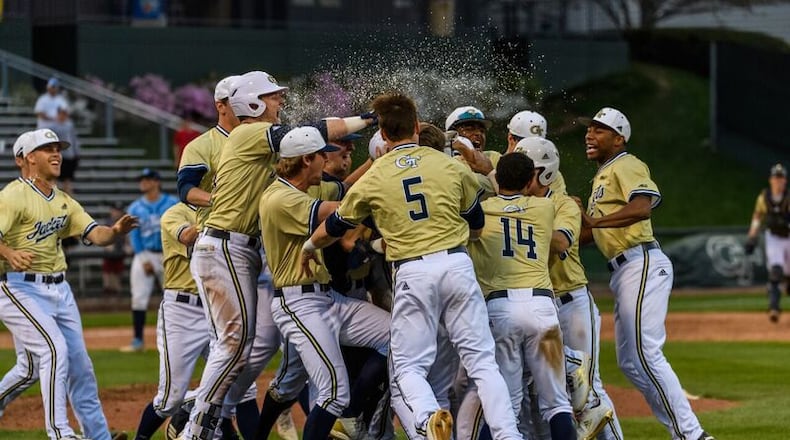It was mid-January, and inclement weather had forced Georgia Tech’s baseball team into the football team’s indoor practice facility to train. With a slight break in the weather, coach Danny Hall and his staff were willing to go out on the field to take batting practice with a defense in place, but put it to the team to decide.
Players were resistant, but eventually chose to go out onto the field.
“And before you know it, we’ve got a great workday in,” assistant coach James Ramsey said.
There are many reasons why Hall’s team has enjoyed a return to the top 25 and a spot atop the ACC’s Coastal Division. The pitching is deeper. Hitters have made opposition pay with a more selective approach. But undergirding the revival, coaches and team members submit, is a changed mindset embodied in that cold-weather practice.
“We’re all just trying to do stuff for the team, have at-bats for the team, making pitches for the team,” two-way star Tristin English said. “Essentially, that’s what’s making us win baseball games.”
Going into its three-game series at Duke starting Friday, Tech is 33-14 and tied for first in the Coastal with North Carolina. The Yellow Jackets have not had that many wins at the 47-game mark since 2011, which was the last time that they hosted an NCAA regional.
Ranked No. 9 in RPI, the Jackets are well on their way to being at home for the opening weekend of the NCAA tournament and are in contention to be a top-eight host, which would enable them to be at Russ Chandler Stadium for the super-regional round.
Hall cautioned against being too giddy at this point, but the change in the team culture is apparent. He and others point to the influence of Ramsey, a Wesleyan School grad who starred at Florida State. He returned to FSU in August after a seven-year minor-league career as a volunteer coach, but Hall hired him as a full-time assistant in January to replace Mike Nickeas, who left the team because of a family medical situation.
“I just think he’s done a good job of making everybody just buy into the team, as opposed to, ‘Well, our pitchers threw good today, but the offense was bad,’ or ‘The offense scored 10 runs, but we still lost 11-10,’” Hall said.
That ethic might be best exhibited in how the Jackets have won their past eight weekend series, seven against ACC competition. (The seven consecutive ACC series wins is a school record.) They won five of them after losing the series opener. In the past two seasons, Tech was 1-9 in weekend series after losing the opener. It speaks to Tech’s improved pitching depth, certainly, but also to resolve.
“Most seasons, we’ve kind of rolled over after the Friday loss and, ‘Well, that was our best shot,’” ace pitcher Connor Thomas said. “’We can’t beat these guys.’ But we’re just a completely different team this year. I love it.”
Ramsey also has helped train Tech hitters to adopt a more patient approach at the plate. As English explained, he swings only at pitches that he knows he can hit hard until he gets to two strikes.
“Like a borderline outside fastball is not a pitch that I can do any damage with,” English said. “(Ramsey is) like, just spit on it. (The umpire) calls it a ball, now you’re up 1-0 on the pitcher. Now if you have a chance to hit a different pitch, that may be in your zone.”
Tech is 12th in on-base percentage this season, at .408, up from 70th last season, at .376. The Jackets strike out once per 4.5 at-bats, compared with 4.2 at-bats last season.
They’re making at-bats count. Tech is 9-4 in one-run games after compiling a 7-14 record in the past two seasons. The Jackets have won four games in their final turn at-bat.
As Ramsey put it, this is the mindset that he is trying to help players absorb: “When you look across at another dugout, we feel like we’re the better team, and it’s the way that we train and it’s the way ultimately we go out and compete that’s going to prove that.”
Hall noted, too, the addition of volunteer coach Dan Jaffe, and was careful to point out that he, pitching coach Jason Howell, former volunteer coach Eric Patterson and Nickeas already were trying to make gains in addressing matters such as culture and commitment. But he also acknowledged that some things may have slipped through the cracks.
“Sometimes change is good,” he said. “In this case, it’s been very good.”
One other change: After every series win, the team gets a steak dinner the following week. When it’s before a road trip, the team goes out to a restaurant. Beyond motivation, the time together has helped build bonds within the team and perhaps made players feel more valued. (Thomas said previously, the Thursday night dinner before a road series might have been at the Golden Corral.)
It was an idea hatched by Ramsey, and one that he, Hall and the athletic department’s development office had to go out and ask for contributions to cover the cost. Hall said it’s called the “fueling plan.”
A happy problem for Hall: Eight consecutive series wins has caused the fueling plan account to get a little thin.
“No doubt,” he said. “We’ll just go try to get some more.”
About the Author
Keep Reading
The Latest
Featured



